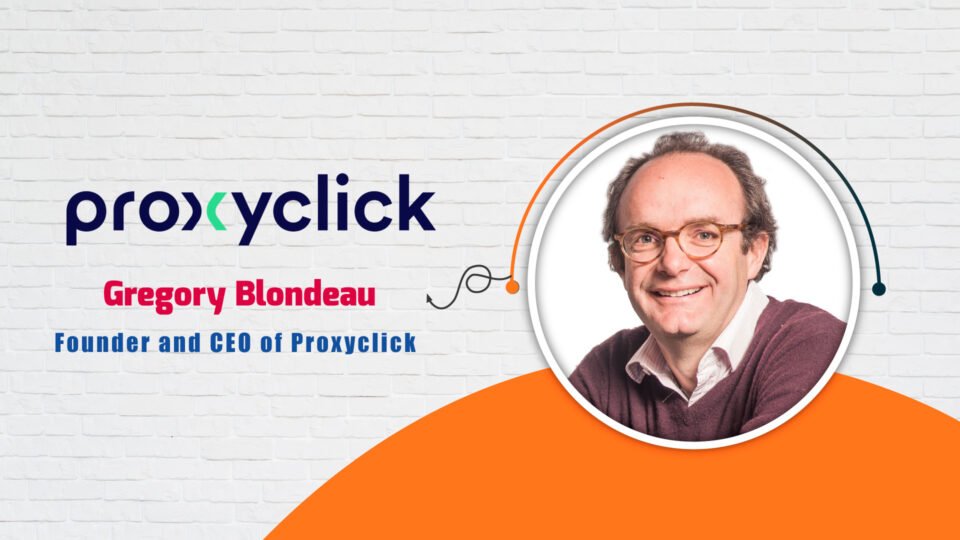Gregory Blondeau, founder and CEO of visitor check-in software Proxyclick, discusses how AI can help companies once they start digitizing visitor data
1. Tell us how you came to start your company Proxyclick and what your role as a CEO entail? How did you come into the visitor check-in software management space?
From the very beginning of my professional career, I’ve always wanted to be an entrepreneur. My journey into the visitor management software industry started with my extensive travel and visits to many offices. During those experiences, I’ve always been concerned by how poorly I was welcomed at the front desk of various locations. Security was extremely limited, and my personal data was often exposed in ways that made me uncomfortable.
I knew I wasn’t alone. So, based on these experiences and problems, I first proposed a solution to address these front desk issues back in 2011. Bringing that up to the present day, Proxyclick is now a truly best-in-class solution for managing on-premise visits. Our platform is designed to make the visitor experience seamless and secure, while simultaneously respecting visitor privacy.Today, we work with some of the world’s biggest enterprises including L’Oréal, Vodafone and Airbnb locations across the globe. We’re currently expanding aggressively in the US, which is our biggest market.
2. How do you think has the visitor management / access control market changed in the last decade?
As I see it, the biggest change is the fact that visitor management is now part of the mainstream.
So, the scope, decision drivers and key people involved are not the same as in the early days.We’ve also watched it move from a local, office-related subject mainly handled by facility managers to a more global, security and privacy-driven priority handled by chief information security officers (CISOs).
In terms of moving forward, and of course in the aftermath of COVID-19, any inefficient, inflexible, or outdated methods for bringing people on-premises needs to shift fast and in a big way. It’s no longer a question of whether organizations should go paperless or not. It’s really more about how quickly and flexibly it can be done. Today, the top priority for leadership teams needs to be maintaining business continuity by putting procedures in place to help keep their teams healthy and safe. This entails further digitalization of the workplace, which should include using cloud-based software solutions to lower worker health risks as much as possible.
In the immediate future, we foresee more seamless access control and parking system integrations combined with an effort to remove physical interfaces or tablets at check-in, in favor of an entirely touch-less check-in process. We will also see heightened scrutiny among food production and manufacturing sites combined with demand for centrally managed software to track every visitor entering a workplace.
3. What are the current challenges that customers come to you with in visitor access management?
For starters, there’s an overall lack of efficiency in the front desk experience and far too many missed opportunities to make a positive impression on visitors. There’s also still a disturbing lack of security at too many locations.
When you consider the thousands of visitors and contractors entering offices and production sites every day, you can understand why this represents an alarming threat to the safety of everyone at the location.
As I mentioned earlier, personal data is too easily exposed during the check-in process. Proxyclick is a solution to all of these challenges, while also ensuring full compliance. We are also helping enterprises project a strong brand image and make a positive impression on their visitors from the very first interaction onsite.
4. How has automation changed visitor management?
It’s fair to say that we’re only at the very early stages of deploying automated technologies like ML and AI in our field. That’s mainly due to the fact that most companies haven’t digitized their visitor data yet, which is the first step in the process. Once that’s more widespread, AI will undoubtedly help companies operate and secure their locations more easily.
In the meanwhile, our technology allows organizations to automate many steps in the visitor journey. Starting with automated invitation emails to pre-registered visitors, and notifications sent to hosts once visitors are checked-in, to the automatic deletion of personal data in line with data privacy regulations: Proxyclick is currently the only solution that provides this much automation from start to finish of the visitor flow.
5. What’s been holding the industry back from providing an ecosystem of identity technologies?
For a long time, all the smart technologies we’ve come to know and love have existed in silos. Although they’re built to talk to each other, we’ve yet to see a true ecosystem of identity technologies outside of a bit of facial recognition and fingerprint reading. This is probably in large part due to the fact that biometric tech is quite expensive, and have come under scrutiny recently because of privacy concerns. That’s not to say we won’t see identity technologies make another run for market fit. However, as consumers and global citizens, we’ll need to be reassured that there’s enough protection built into the technology. The benefits are tremendous and would change the way we look at our physical and virtual identities in a safer more secure world.
6. Getting people back to work post COVID is being discussed extensively. However, many buildings / facilities are unsure how to proceed. How is Proxyclick helping its customers with this?
We’ve been working for months now on a framework that will help organizations to be Return Ready when the time comes for re-entry into the workplace. We allow you to prepare, prevent, and protect your way to a safe and secure return for your employees and visitors. You can use our platform to screen all visitors before they arrive using its pre-registration features. You can also add custom fields per visitor that are only visible internally. These features allow hosts to review any potential risks and procedures associated with a particular visitor and thereby ensure that the visit meets the health and safety requirements of your organization. Taking the time to prepare and put such measures in place is just the start.
For visitors, you can also record their phone number and email addresses within our platform. Should the visitor become exposed to the virus while on your premises, you can immediately and discreetly notify them.
Proxyclick also allows you to add specific health and safety procedures or information to a given agreement. You can send this agreement to the visitor for signing in advance via an invitation email. Within that email, you can also include any necessary health or safety-related instructions specific to your location. For example, you let visitors know in advance that temperature screening will be done once they arrive onsite so there are no potentially unpleasant surprises.
Once a visitor has signed an agreement and reviewed necessary health and safety procedures beforehand, the Proxyclick interface prompts them with conditional questions to answer upon arrival. You can also build a logical flow of questions using customs screens specifically related to COVID-19 risk. If a visitor indicates via a response to the invitation that they are potentially at risk of being infected, you can prompt a specific message that denies entry to your location. As part of your duty of care, you’ll need to prevent visitors who pose a risk from entering your premises. But you’ll need to ensure you protect your employees and any visitor data by proactively managing and deleting any sensitive information. We automate that process for you.
7. Proxyclick recently raised a Series B funding round earlier this year. Where do you see this funding being deployed?
We raised a $15 million Series B round led by Five Elms Capital, together with previous investor Join Capital. In total, oursystems have now been used to register more than 30 million visitors in 7,000 locations around the world. In the U.K. alone, more than 1,000 locations use our tools. Current customers include L’Oréal, Vodafone, Revolut, PepsiCo and Airbnb, as well as a number of other Fortune 500 firms.
We’re using the new funding to accelerate our roadmap. Specifically, we’re looking to integrate our solution with more third-party systems with a focus on physical security features and facial recognition, as well as adding new enterprise features.
8. What do you think will be the next big breakthrough in visitor management?
What excites me is a world where security is increased, but not at the expense of privacy. And, a situation where front gates are only closed to those not complying or not meeting requirements such as visitors who carry an expired driver’s license. I also envision a front desk experience that is open to everyone who does meet requirements to the point that they don’t even realize there is security in place. There are technologies available now that make all of those things possible. It’s a very exciting time in our industry with more to come. Our team is working on a new offering that will revolutionize the state of the industry of visitor management. We’ll be sharing more in the months to come.
9. What is your advice for a company or an individual starting out in the visitor check-in software management space?
Much like other industries that came before ours, tech is transforming the security and property world and creating a tremendous amount of value for those who invest in platforms like ours. With that in mind, it is critical for security professionals to remain up-to-date on the latest tech solutions available, like Proxyclick.

Gregory Blondeau
Founder and CEO of Proxyclick visitor check-in software, Gregory Blondeau, started his career working for the Private Telecommunications Division of Siemens AG. His travels in Munich, London and Paris led to his start

